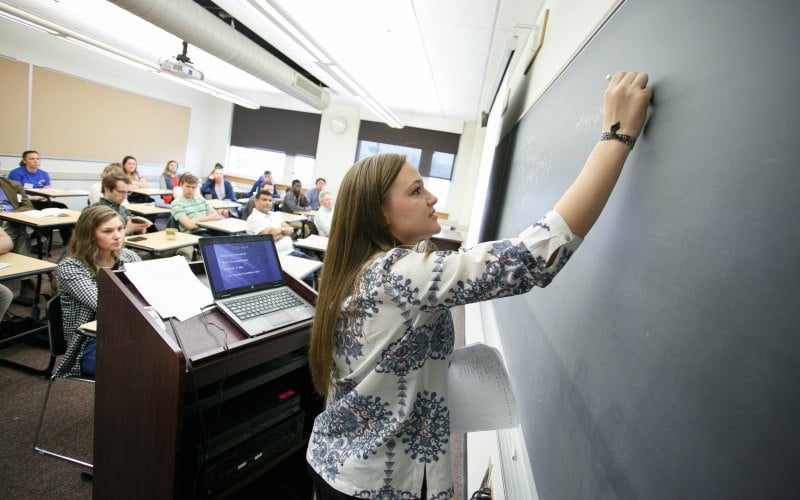Mathematics Department

Mathematics Department Overview
Hartwick offers a major program in mathematics. Both majors urge students to ask their own questions, and provide them not only with an understanding of mathematical principles and the application of those principles to their questions, but also with the ability to think logically and express themselves precisely and creatively. Mathematics students at Hartwick are strongly encouraged to learn to work independently and pursue their own interests within either major. While pure mathematics provides a solid foundation in the areas of science and logic, actuarial mathematics provides various applications to economics, finance, business, and accounting. For the three-year students who do not have time for a double major, we recommend minoring in mathematics to support their major.
Please note: Hartwick College focuses on offering fall, January, and spring term undergraduate courses in person, however circumstances may require us to offer a small number of courses in this department through distance education. In times of emergency, following regulatory guidelines, all classes may temporarily need to be delivered through distance education, including online. We also offer a slate of courses online in the summer to help our students make progress towards their degrees. With support from an academic advisor, students needing particular courses may have other online options as well. If you have questions about the way courses are delivered in your program, please contact your Department or Program Chair.
Where mathematics can take you....
The study of math enhances many other majors and minors.
Economics is applied mathematics in current form.
Mathematics prepares students for work in computational psychology as well as making the statistical tools of research more accessible.
Mathematics is very useful in physical chemistry, and also in some of the research applications having to do with rational drug design.
Mathematics improves graduate career prospects especially useful when doing computational biology, genetics, and bio-informatics.
Almost all computer science research and development comes out of mathematical ideas.
Mathematics prepares students for graduate work in epidemiology and biostatistics.
Mathematical skills are necessary for logistics, business analytics, and optimization.
Mathematics skills are used for business analytics, risk management, and actuarial work.
Mathematical skills are valuable to those pursuing careers as analysts for government security agencies.
These skills also give students background to learn survey design and sampling theory which are sometimes used in developing questionnaires and surveys.
Physics is applied mathematics.
Mathematics and physics are the primary tools of engineers.
Those interested in quantitative sociology who study mathematics will be better prepared for graduate work involving survey design and sampling theory both used by the quantitative branch of sociology.
Knowledge of mathematics is especially useful for those interested in geo-dynamics and seismology.
Mathematics provides a better foundation for understanding statistics of medicine and public health. More and more mathematical modeling is being done on the human body and this opens the door for those who wish to pursue that area of research.
For those who wish to work in the bridge area of physical anthropology and genetics, the study of mathematics helps prepare them for some of the computational issues they will face.
Forensic statistics, crime analytics, epidemiological tools are used in the modeling of violent crime patterns (disease-like behaviors). Criminologists use math to determine validity and reliability of forensic tools.
Mathematics is used in modeling environmental processes, helping determine financial values for environmental services, solid computational skills to aid in analytical aspects of sustainability.
Teachers with mathematics backgrounds become a resource person for their school and demonstrate that students do not need to fear math. This background is also an asset in gaining K-12 certification.
This combination offers a solid path to become a math teacher, prepare for a graduate career in educational statistics, or prepare for a graduate career in quantitative educational research.
The discipline primarily uses physics and math as its tools.
Biochemists use mathematics when modeling RNA processes, creating rational drug design, and studying pharmo-kineitcs.